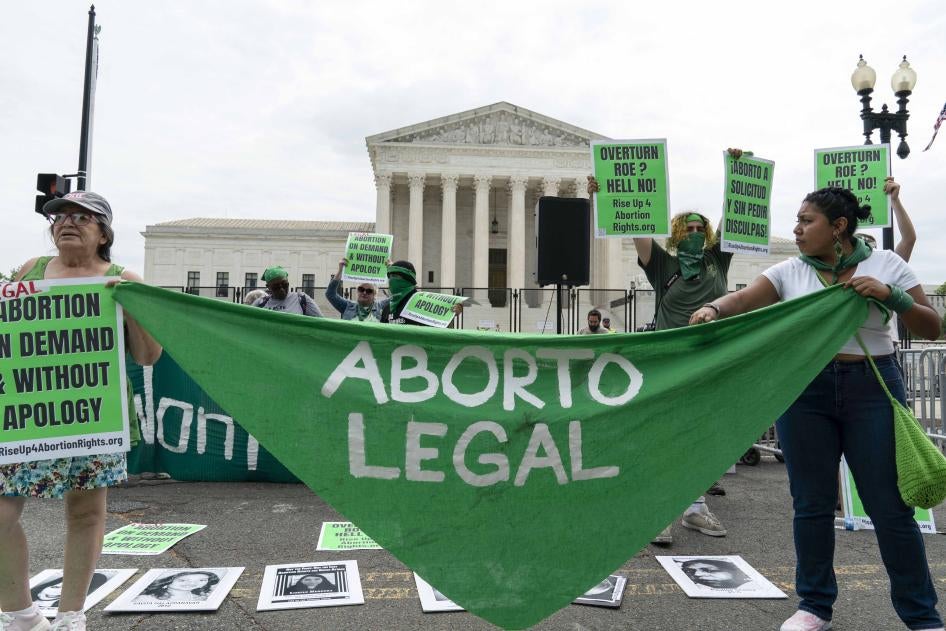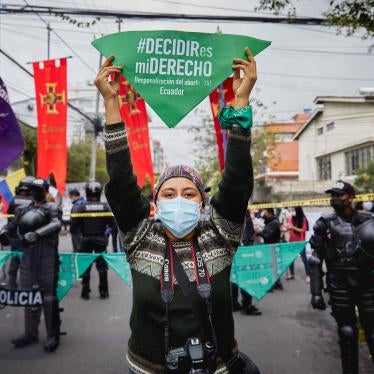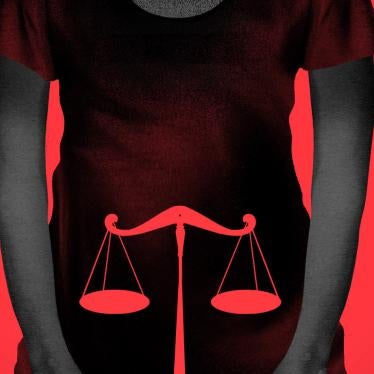Access to safe and legal abortion is a matter of human rights, and its availability is the best way to protect autonomy and reduce maternal mortality and morbidity.
Is abortion a human rights issue?
Access to safe, legal abortion is a matter of human rights. Authoritative interpretations of international human rights law establish that denying women, girls, and other pregnant people access to abortion is a form of discrimination and jeopardizes a range of human rights. United Nations human rights treaty bodies regularly call for governments to decriminalize abortion in all cases and to ensure access to safe, legal abortion in certain circumstances at a minimum.
What are the human rights consequences of restricting or banning abortion access?
Countries have obligations to respect, protect, and fulfill human rights, including those concerning sexual and reproductive health and autonomy. Where safe and legal abortion services are unreasonably restricted or not fully available, many other internationally protected human rights may be at risk, including rights to nondiscrimination and equality; to life, health, and information; to freedom from torture and cruel, inhuman and degrading treatment; to privacy and bodily autonomy and integrity; to decide the number and spacing of children; to liberty; to enjoy the benefits of scientific progress; and to freedom of conscience and religion.
These rights are set out the Universal Declaration of Human Rights, and protected in many international treaties, including the International Covenant on Economic, Social and Cultural Rights (ICESCR), the International Covenant on Civil and Political Rights (ICCPR), the Convention Against Torture (CAT), the Convention on the Elimination of All Forms of Discrimination Against Women (CEDAW), and the Convention on the Rights of the Child (CRC), as well as in regional level treaties in Africa, the Americas, and Europe.
For nearly two decades, Human Rights Watch has documented the human rights harm of restricted or banned access to abortion in countries around the world, including in the US, Ecuador, Argentina, Brazil, the Dominican Republic, and Ireland.
What is the Human Rights Watch position on abortion?
Human Rights Watch believes that reproductive rights are human rights, including the right to access to abortion. States have the obligation to provide women, girls, and other pregnant people with access to safe and legal abortion as part of their core human rights responsibilities.
As Human Rights Watch has stated in amicus curiae briefs to high courts in countries around the world – from Brazil and Colombia to South Korea and most recently with partner organizations in the United States – international human rights law and relevant jurisprudence support the conclusion that decisions about abortion belong to a pregnant person alone, without interference or unreasonable restriction by the state or third parties.
Is the right to life at risk when access to abortion is restricted or banned?
Yes. Legal restrictions on abortion often result in more illegal abortions, which may also be unsafe and may drive higher maternal mortality and morbidity. As a result, lack of access to safe and legal abortion puts the lives of pregnant people at risk.
According to the World Health Organization (WHO), complications from pregnancy and childbirth are the leading cause of death for girls and young women ages 15 to 19, and children ages 10 to 14 have a higher risk of health complications and death from pregnancy than adults. WHO has also found that the removal of restrictions on abortion results in the reduction of maternal mortality.
The UN Human Rights Committee (HRC), which monitors states’ compliance with the ICCPR, has noted the relationship between restrictive abortion laws and threats to women’s and girls’ lives. It has explicitly clarified that states parties cannot regulate access to abortion in any way that requires pregnant people to resort to unsafe abortions, and that states must provide safe, legal, and effective access to abortion to prevent risk to the lives and health of pregnant people, and to ensure that they are not subject to substantial pain or suffering, most notably in cases where pregnancy is the result of rape or incest, or the pregnancy is not viable.
Do restrictive abortion policies reduce the rate of abortions?
Abortion restrictions do not prevent abortions. Research has shown that when abortion is banned or restricted, the number of abortions does not decrease. Abortions just move underground. This increases the risk both of unsafe procedures and that people will be reported to police or prosecuted for suspected abortions.
The rate of unsafe abortions is nearly 45 times higher in countries with highly restrictive abortion laws than in countries where abortion is legal and unrestricted.
Restrictive abortion policies push pregnant people seeking abortions, especially those living in poverty or rural areas, out of the healthcare system and into unsafe, unregulated settings. WHO has also stated that lack of access to safe, affordable, timely, and respectful abortion care, as well as the promotion of stigma associated with abortion, poses risks to abortion seekers’ physical and mental well-being throughout their lives.
Who will be most harmed from restrictions on access to abortion?
Not all pregnant people are likely to experience the human rights and health harm of restricting abortion equally. Young people and marginalized groups including Black, Indigenous, and other people of color, people living in economic poverty, and sexual and gender minorities are more likely to be harmed. The UN Human Rights Committee has held that lack of availability of reproductive health information and services, including abortion, undermines women’s right to nondiscrimination.
The UN Human Rights Committee, like the Committee on the Elimination on Discrimination Against Women, has also noted that restrictions on abortion result in the disproportionate practice of illegal, unsafe abortions by poor and rural women or women unable to travel outside a jurisdiction where abortion is banned. The UN Committee on the Rights of the Child has also said that punitive abortion laws constitute a violation of children’s right to freedom from discrimination.
Even where abortion is technically legal, heavy restrictions can make it inaccessible to marginalized people. This forces pregnant people, particularly from marginalized groups, to look for unsafe and clandestine abortion opportunities and to risk criminal or civil penalties, even when their circumstances fall within what is legally permissible.
Moreover, the Committee on Economic, Social and Cultural Rights has said, “[a] wide range of laws, policies and practices undermine the autonomy and right to equality and non-discrimination in the full enjoyment of the right to sexual and reproductive health, for example criminalization of abortion or restrictive abortion laws.” It has also noted that restrictions on abortion particularly affect women living in poverty or without or with less formal education. Similarly, six UN experts stressed in a 2015 joint news release that in El Salvador, “the total ban on abortion disproportionately affects women who are poor.”
What has the UN said about lack of access to and criminalization of abortion?
UN human rights treaty bodies, which monitor countries’ compliance with relevant treaties and that report or advise on human rights related to specific themes or countries, have consistently called for decriminalization of abortion and the full realization of sexual and reproductive rights, including access to safe, legal abortion.
Examples of statements from these mechanisms in relation to abortion include the following:
The CEDAW Committee, which monitors compliance with CEDAW, stated that:
Unsafe abortion is a leading cause of maternal mortality and morbidity. As such, States parties should legalize abortion at least in cases of rape, incest, threats to the life and/or health of the mother, or severe fetal impairment, as well as provide women with access to quality post-abortion care, especially in cases of complications resulting from unsafe abortions. States parties should also remove punitive measures for women who undergo abortion.
The committee has made similar recommendations to many governments while reviewing their compliance with the treaty. These recommendations typically call on governments to decriminalize abortion in all cases, legalize abortion in the circumstances noted above, and guarantee access.
The Human Rights Committee, which monitors states’ compliance with the ICCPR, has noted the relationship between restrictive abortion laws and threats to women’s and girls’ lives and has clarified the scope of States parties’ obligations to protect their right to life. In particular, “restrictions on the ability of women or girls to seek abortion must not, inter alia, jeopardize their lives.” The committee has frequently expressed concern about criminalization of abortion and has called for expanded access.
Like the CEDAW Committee, the Human Rights Committee, the Committee on Economic Social and Cultural Rights (which monitors the ICESCR), and the Committee against Torture, (which monitors CAT), have called the removal of penalties for abortion and for the implementation of measures to ensure safe, legal access to abortion. Where safe abortion is not available it can pose risks to mental health, including severe anguish and risk of suicide. The tie between mental health and restrictions in access to reproductive health is so clear that the UN Committee against Torture has expressed concern at the severe physical and mental anguish and distress experienced by women and girls due to abortion restrictions, and concluded that criminalization and inaccessibility of abortion can be incompatible with a government’s duty to uphold the right to freedom from torture and other cruel, inhuman or degrading treatment or punishment.
Similarly, the UN Committee on the Rights of the Child has urged states to “decriminalize abortion to ensure that girls have access to safe abortion and post-abortion services, review legislation with a view to guaranteeing the best interests of pregnant adolescents and ensure that their views are always heard and respected in abortion-related decisions.” In many individual state reviews of treaty compliance, called concluding observations, the committee explicitly called for decriminalization of abortion “in all circumstances.”
The UN special rapporteur on the right to health has said that criminal laws penalizing and restricting induced abortion are “impermissible barriers to the realization of women’s right to health and must be eliminated.”







